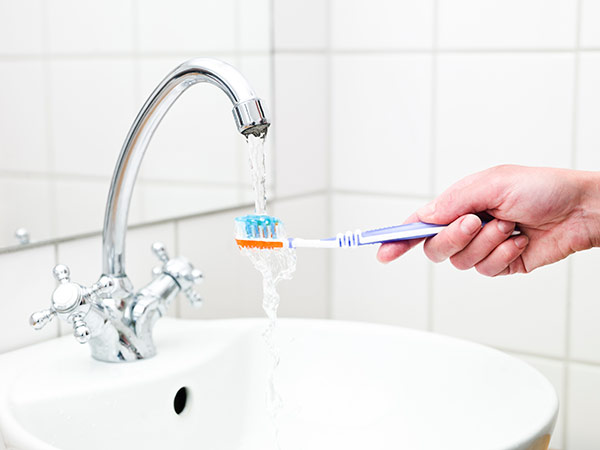
If a toothbrush keeps your mouth clean, isn’t it important to keep your toothbrush clean too? Absolutely! But to what extent should you be cleaning your toothbrush every day? There are plenty of products and methods for disinfecting a toothbrush – discover what you can do to help keep your toothbrush ready to safely remove plaque from your teeth and gums!
Does a Toothbrush Need to be Disinfected?
Your toothbrush spends four minutes a day in your mouth, brushing away bacteria and plaque that have built-up on your teeth and gums. Even with toothpaste, brushing your teeth doesn’t directly kill these bacteria – it just displaces it from your mouth, which protects your mouth from decay and long-term gum disease.
Many people wonder if using a toothbrush is truly hygienic, due to the number of bacteria that must stick to the bristles between uses. This has lead to many oral care companies producing disinfectants and promoting ways to disinfect a toothbrush.
According to the American Dental Association (ADA), it’s not necessary to disinfect a toothbrush. In fact, many of the non-approved products available over-the-counter do nothing to truly help disinfect your toothbrush. Even worse, they could damage the bristles and leave it ineffective for cleaning your teeth!
Can Toothbrushes Spread Illness?
It’s no secret that the mouth contains bacteria and is one of the most common sources of transmitting illness. But if you’re worried about re-infecting yourself with a cold or flu after brushing your teeth while sick, don’t fret!
While it’s true that the bacteria or virus may still be on your toothbrush, your antibodies will protect you from catching the exact same illness from them.
Other than that, a toothbrush can only spread illness if it comes in contact with another toothbrush or someone else’s mouth. It should go without saying not to share your toothbrush! However, it’s also important not to store them in a “shared” storage like a mug that may allow them to brush against each other.
You’re Already Cleaning Your Toothbrush Perfectly!
It’s understandable to be worried about the bacteria on your toothbrush. But almost everyone who regularly brushes their teeth already practices the best habit for cleaning a toothbrush: rinsing it out!
While rinsing a toothbrush under running water won’t remove every single molecule of bacterium, it does a surprising job of cleaning most bacteria off. It also removes food particles that may have been in your mouth.
Just like brushing your teeth, the trick is to prevent a build-up of bacteria. By using your toothbrush twice a day, and rinsing it out each time, your toothbrush will stay relatively clean of bacteria and will be perfectly safe to use for a few months, until you replace it.
Avoid These Unnecessary or Harmful Toothbrush Cleaning Suggestions
If you search online, you may come across several articles that discuss ways to disinfect a toothbrush. In most cases, these steps are unnecessary. However, a few recommendations could be major dental mistakes!
Toothbrush Sterilizing Fluids
There are fluids commonly sold over the counter, in which to soak your toothbrush. Depending on the active ingredients, some of these may actually do what they say. But many rinses have not been proven to do anything at all!
Even FDA-approved sterilizers won’t kill all the bacteria, leaving it no more effective than simply rinsing your toothbrush. Even if it did, the ADA still hasn’t identified any need for such a thorough sterilization of your personal toothbrush. Unlike dental equipment, which can be used on multiple patients, there’s no risk of transmission as long as you’re the only one that uses it!
Boiling a Toothbrush
Like anti-bacterial rinses, boiling your toothbrush does remove bacteria. Again, however, it hasn’t been proven to completely eliminate them.
The key risk of boiling your toothbrush is that it does damage to the bristles and plastic. While you may make it somewhat cleaner, boiling water will wear down the entire toothbrush, requiring it to be replaced more quickly.
In the end, you’ll spend more on new toothbrushes and won’t make a significant difference on your oral health.
Dishwasher or Microwave
Some articles online suggest using a microwave or dishwasher to clean your toothbrush. Don’t do this! Not only will they do little to help clean your toothbrush, they can do real damage. Toothbrushes aren’t designed for excessive heat, and with all that plastic, they’re likely to melt. A melted toothbrush in your dishwasher can ruin it and potentially contaminate other items inside.
Ways to Keep Your Toothbrush Clean
Fortunately, keeping your toothbrush ready to use is very easy. Just follow these simple steps:
- Never share your toothbrush.
- Don’t store a toothbrush inside a cap, as it traps moisture and encourages bacterial or mold growth
- Avoid contact with other toothbrushes, such as storing the family’s toothbrushes in a single cup.
- Replace your toothbrush when it’s worn, which is typically around 3-4 months of use.
If you have these ingrained as habit, along with brushing twice a day, you’ll be seeing signs of great oral health in no time!
Keep Your Mouth Healthy – Schedule an Appointment
Pointe Dental Group can provide you with a complete examination, answer your questions, and discuss your treatment options. Schedule an appointment with us today! New patients can receive FREE comprehensive exam and consultation, plus a full panoramic x-ray with a paid cleaning procedure (a $200 value)!
Grosse Pointe Farms: (313) 881-2480
Shelby Township: (586) 803-8300
Don’t miss a thing! Connect with us on Facebook.
